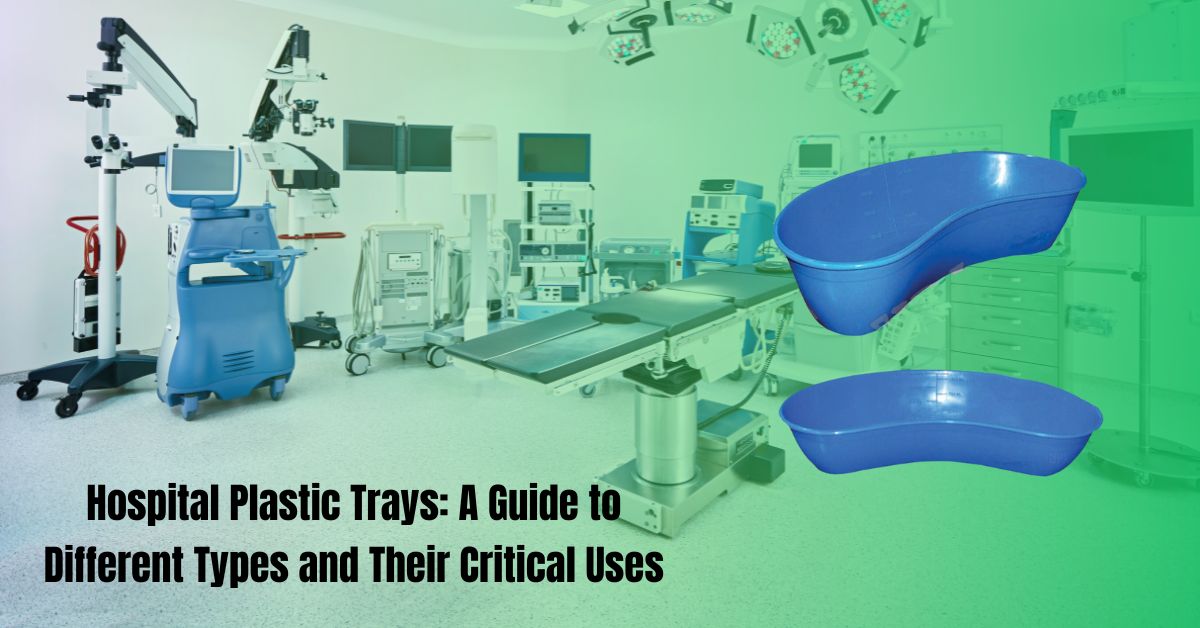When we think of hospitals, we often focus on the life-saving equipment, dedicated staff, and cutting-edge treatments. However, there’s an unsung hero in healthcare facilities that deserves our attention: the hospital plastic tray. These versatile tools play a crucial role in patient care, infection control, and operational efficiency. Let’s dive into the world of hospital plastic trays and explore their various types and essential uses.
Why Are Hospital Plastic Trays So Important?
The ubiquity of plastic trays in healthcare settings is due to their unique combination of properties:
- Durability: They withstand frequent use and cleaning.
- Lightweight: Easy to carry and maneuver in busy hospital environments.
- Customizable: Available in various sizes and configurations.
- Hygienic: Non-porous surfaces resist bacterial growth.
- Cost-effective: Affordable and long-lasting.
Now, let’s explore the diverse world of hospital plastic trays:
Medication Administration Trays
These trays are the workhorses of hospital wards. Designed with multiple compartments, they help nurses organize and transport medications safely. The layout often follows a logical sequence, mirroring the order of medication rounds. Some even come with built-in pill crushers or liquid measuring cups. These design features contribute to improved patient safety and reduced medication errors.
Procedure Trays
When a doctor or nurse needs to perform a specific medical procedure, they reach for a procedure tray. These trays come pre-packed with all the necessary tools and supplies for tasks like catheterization, wound dressing, or suture removal. The efficiency gained from these organized kits is remarkable. Hospitals carefully consider which items to include in each type of procedure tray, balancing convenience with the need for customization in unique cases.
Instrument Trays
In the high-stakes environment of operating rooms, instrument trays are indispensable. These sturdy plastic trays hold sterilized surgical instruments in a precise arrangement. The organization of these trays is a fine art, with each instrument placed strategically for easy access during surgery. The layout of these trays is carefully designed for different types of surgeries, ensuring efficiency and sterility from the autoclave to the operating table.
Laboratory Sample Trays
Behind the scenes in hospital laboratories, plastic trays play a crucial role in organizing and transporting patient samples. These trays often feature specialized inserts to hold test tubes, vials, or slides securely. Lab technicians use color-coding and other visual systems with these trays to prevent mix-ups. Ongoing innovations in tray design continue to improve sample tracking and handling.
Food Service Trays
While not directly related to medical procedures, food service trays are an essential part of patient care. These trays are designed to hold meals and utensils, often with separate compartments to keep foods at different temperatures. Hospitals strive to balance durability, ease of cleaning, and patient comfort in designing these trays. Some facilities are exploring the integration of smart technology into these trays to track patient nutrition and assist with dietary restrictions.
Storage and Organization Trays
Hospitals require efficient storage solutions, and plastic trays answer the call. From organizing supplies in crash carts to storing patient belongings, these trays come in a variety of sizes and configurations. Optimal tray sizes for different storage needs are determined through careful analysis of space utilization and inventory management practices. These trays play a crucial role in maintaining supply chain efficiency within healthcare facilities.
Specialty Trays
Some medical specialties require unique tray designs. For example, dental trays feature specific layouts for oral procedures, while ophthalmology trays are designed to hold delicate eye instruments. Many other medical specialties have developed custom tray designs to meet their unique needs, contributing to improved patient outcomes and procedural efficiency.
The Future of Hospital Plastic Trays
As healthcare continues to evolve, so too will the design and functionality of hospital plastic trays. We might see the integration of RFID technology for improved tracking, antimicrobial materials for enhanced infection control, or even smart trays that can monitor inventory levels in real-time.
The next time you find yourself in a healthcare setting, take a moment to notice the variety of plastic trays in use. These unassuming tools are silent partners in patient care, contributing to the smooth operation of hospitals and clinics worldwide. From medication management to surgical precision, hospital plastic trays prove that sometimes, the simplest solutions can have the most significant impact.
In conclusion, hospital plastic trays are far more than just simple containers. They are meticulously designed, highly specialized tools that play a vital role in modern healthcare. As medical technology advances, these humble trays will continue to evolve, adapting to new challenges and contributing to better patient care outcomes.






